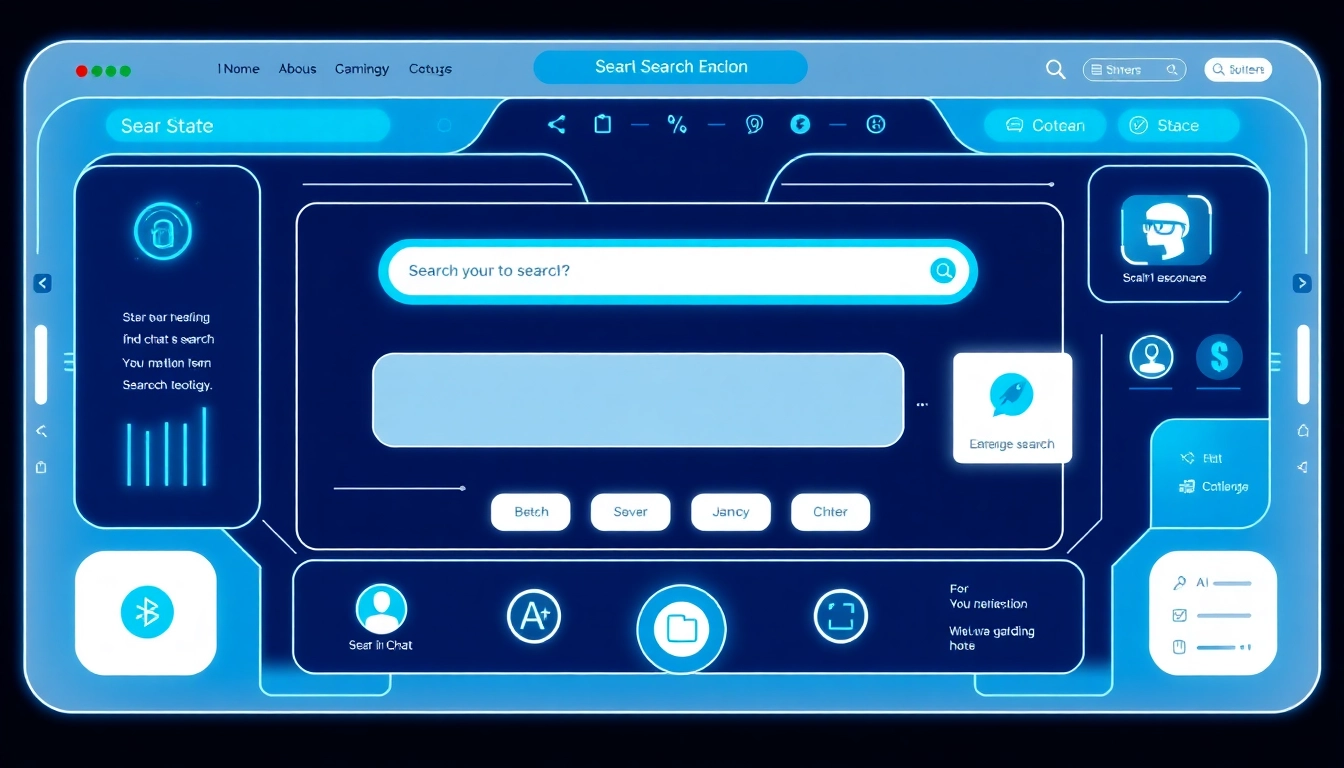Introduction to AI Search Engines
In today’s digital era, finding information quickly and efficiently is paramount. Traditional search engines have served us well, but they often struggle to deliver the depth and context users require. This is where AI search engines come into play, leveraging cutting-edge technology to enhance our information retrieval capabilities. These advanced tools use artificial intelligence to interpret, analyze, and synthesize data, making them indispensable for both casual users and professionals alike. In this comprehensive exploration, we will delve into the world of AI search engines, their evolution, the advantages they offer, and their growing significance in various domains.
What is an AI Search Engine?
An AI search engine is a sophisticated software application that utilizes artificial intelligence to enhance the search experience and retrieve information from the internet or databases. Unlike traditional search engines that rely on algorithms to match keywords to databases, AI search engines employ machine learning, natural language processing, and predictive analytics to better understand user intent and document relevance.
How AI Search Engines Work
AI search engines analyze vast amounts of data, learning from interactions to improve their performance. They can interpret context, understand natural language queries, and provide results that are not only relevant but also ranked based on user preferences and past behaviors. Essentially, these engines do not just return a list of links; they deliver contextualized and prioritized information tailored to the user’s specific needs.
Historical Context and Evolution
The concept of a search engine began with primitive methods by cataloging information in the early days of the internet. The introduction of Google in the late 1990s marked a significant shift with its algorithm-based approach, focusing mainly on keyword relevance and backlinks. However, as the volume of data on the internet grew exponentially, traditional methods began to falter.
The advent of AI changed the landscape dramatically. By the early 2010s, search engines began incorporating elements of artificial intelligence into their algorithms. Advances in natural language processing and machine learning allowed these tools to process and understand queries more like a human brain would. The introduction of AI chatbots and virtual assistants further paved the way for increased integration of AI in search technology, leading to the AI search engines we rely on today.
The Importance of AI in Search Technology
AI’s role in search technology is pivotal; it provides the ability to analyze context, infer meanings, and even predict user needs. This allows for a richer and more immersive search experience, one that caters more to user satisfaction than mere relevance alone. Furthermore, AI enhances the ability to process real-time data and provides users with updated insights, enabling a more responsive search environment.
Advantages of Using AI Search Engines
Enhanced Accuracy and Relevance
One of the most significant advantages of AI search engines is their ability to deliver results with enhanced accuracy and relevance. Machine learning algorithms analyze user behavior and feedback to refine search results continually. For example, an AI-powered search engine can determine which types of results users prefer for specific queries, dynamically updating its ranking systems based on user interaction patterns.
Speed of Accessing Information
AI search engines are capable of processing vast datasets within seconds, dramatically increasing the speed at which users receive information. This speed is particularly beneficial for industries relying on real-time data analysis, such as finance, healthcare, and e-commerce. In these fields, timely access to information can drastically impact decision-making and operational efficiency.
Personalization and User Experience
AI search engines excel in creating personalized search experiences. By analyzing past behavior and preferences, these engines can tailor search results to show the most relevant content for individual users. For example, an AI search engine could learn that a user often searches for technology news, thus prioritizing tech-related articles and updates in their results. This level of personalization improves user satisfaction and engagement, as searches become more intuitive.
Popular AI Search Engines to Consider
An Overview of Leading Platforms
Several AI search engines have emerged as leaders in the market, each offering unique features and benefits aimed at enhancing the user’s search experience. Notable mentions include:
- Perplexity AI: Known for combining generative AI with real-time web search, Perplexity delivers structured answers with cited sources, functioning as a powerful AI search assistant.
- Microsoft’s Copilot: A robust tool that integrates AI chat capabilities into traditional search, enabling seamless interactions within the search interface.
- Google Gemini: An advanced AI-driven search engine that offers extensive knowledge retrieval and user-friendly navigation, providing comprehensive insights across various topics.
- Brave Search: This privacy-centric search engine utilizes AI to provide accurate search results while ensuring user anonymity.
Comparative Analysis: Features and Benefits
When choosing an AI search engine, it’s essential to consider the features and benefits each platform offers. For instance, while Perplexity excels in delivering cited results, Google’s Gemini provides a more integrated experience with access to Google’s vast ecosystem of tools and applications. Understanding these nuances can help users select the search engine that best meets their needs.
Choosing the Right AI Search Engine for Your Needs
The right choice will depend on various factors, including the type of information you frequently seek, your privacy preferences, and whether you require integration with other digital tools. Users in academia might prefer a search engine like Consensus, which is specifically designed for research purposes, while casual users may prioritize platforms that deliver broader results quickly and efficiently.
The Impact of AI Search Engines on Businesses
Optimizing Marketing Strategies with AI
For businesses, leveraging AI search engines can significantly enhance marketing strategies. By better understanding customer queries and trends, companies can tailor their content and engage in more effective targeted advertising. This ability allows for improved visibility in search results, ultimately driving higher conversion rates.
Improving Customer Engagement
Customer engagement can be markedly improved through AI search engines that facilitate more interactive and responsive service. For instance, businesses that integrate AI chatbots into their websites can offer real-time responses to customer inquiries, enhancing user experience and satisfaction while also gathering valuable feedback that can inform product development.
Measuring ROI: Tools and Metrics
To measure the return on investment (ROI) from using AI search engines, businesses should employ several metrics including traffic analysis, conversion rates, and customer engagement levels. Tools like Google Analytics and other specialized software can help in assessing the effectiveness of AI-driven marketing strategies and refining them further for better results.
Future Trends in AI Search Technology
Innovations on the Horizon
As AI technology continues to evolve, we can expect several innovations to shape the future of search engines. This includes improvements in natural language understanding, predictive analytics, and even augmented reality interfaces that allow users to interact with information in entirely new ways.
The Role of Machine Learning in Search
Machine learning will remain a cornerstone of AI search engines, enabling them to learn and adapt continually. The ability to analyze user interactions and refine algorithms based on real-time data offers a level of personalization and accuracy that traditional search engines struggle to achieve.
Preparing for Changes in User Behavior
As user behaviors evolve, AI search engines must adapt to changing preferences and expectations. For instance, with the increasing reliance on mobile devices for everyday tasks, search engines will need to optimize their interfaces and functionalities for on-the-go usage. Anticipating these shifts will be crucial for providers aiming to maintain relevance in a fast-paced digital landscape.
Conclusion
The landscape of information retrieval is rapidly evolving with the advent and integration of AI search engines. By enhancing accuracy, speed, and personalization, these engines are revolutionizing how we access knowledge in the digital age. As businesses and consumers alike pivot toward these advanced tools, staying informed about the latest innovations and trends will be essential for maximizing the benefits of this technology.



